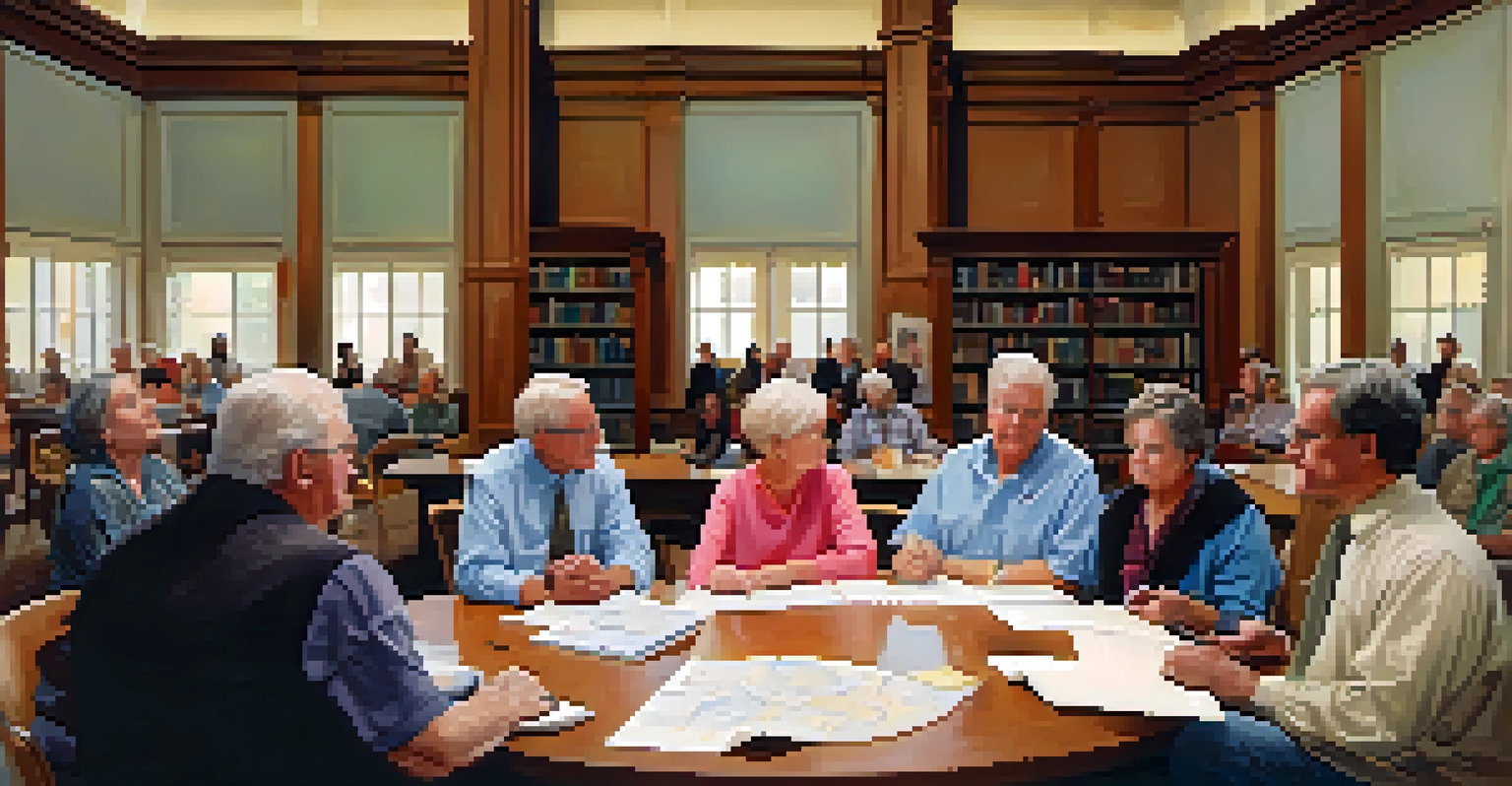Missouri's Local Governments: Structure and Responsibilities

Overview of Local Government in Missouri
Local government in Missouri plays a crucial role in the daily lives of citizens. It encompasses various entities, including counties, cities, and towns, each functioning to meet the needs of their respective communities. The structure is designed to bring government closer to the people, allowing for more tailored services and governance.
The best way to predict the future is to create it.
In Missouri, local governments operate under the authority granted by the state constitution and statutes. This decentralized approach empowers local leaders to make decisions that reflect the unique characteristics and needs of their communities. From urban areas to rural towns, the diversity of local governments ensures representation and responsiveness.
Understanding the framework of local government is essential for citizens to engage effectively. When residents are aware of how their local government functions, they can participate more meaningfully in civic activities, such as town hall meetings and elections, fostering a stronger connection to their governance.
Types of Local Governments in Missouri
Missouri's local government structure includes counties, cities, and municipalities, each with distinct roles. Counties serve as the primary administrative divisions, responsible for services like law enforcement, public health, and infrastructure maintenance. Cities and towns, on the other hand, focus on local ordinances, zoning regulations, and community development.

Missouri has home rule cities, which have the authority to govern themselves within the framework of state laws. This means they can create their own laws and regulations, allowing for greater flexibility in addressing local issues. In contrast, non-home rule cities have to adhere strictly to state laws, limiting their autonomy.
Local Governments: Community Focus
Local governments in Missouri, including counties, cities, and special districts, are designed to address the unique needs of their communities.
Additionally, special districts may be established for specific purposes, such as fire protection or sanitation services. These districts operate independently but serve vital functions that support the broader goals of local government, ensuring communities have access to essential services.
County Governments: Structure and Duties
County governments in Missouri are overseen by elected officials, including a county executive or presiding commissioner, and a county council or commission. This structure allows for a democratic approach to governance, where officials are accountable to the residents they serve. The size and responsibilities of counties can vary, impacting how services are delivered.
Government is not the solution to our problem; government is the problem.
Counties are responsible for numerous essential functions, such as maintaining public roads, administering elections, and overseeing local law enforcement. They also manage social services, public health initiatives, and land use planning, making them integral to community well-being. Understanding these roles can help residents appreciate the importance of county governance.
Moreover, counties often collaborate with other local agencies and organizations to enhance service delivery. This collaboration can lead to innovative solutions to local issues, such as improving public transportation or addressing housing needs, showcasing the importance of teamwork in local governance.
City Governments: Structure and Functions
City governments in Missouri typically consist of a mayor and a city council, who work together to create and implement policies that affect their communities. The mayor often serves as the face of the city, representing its interests and overseeing city operations. Meanwhile, the city council is responsible for enacting laws and regulations.
Cities have the power to regulate zoning, business licenses, and public safety, which directly impacts the quality of life for residents. For instance, city councils may establish curfews, set noise ordinances, or approve new development projects, illustrating their influence on daily life. Engaging with city government allows residents to voice concerns and influence decisions.
Citizen Engagement is Crucial
Active participation from citizens in local governance fosters transparency, accountability, and a stronger connection to community decision-making.
Additionally, many cities in Missouri are implementing innovative programs to enhance community engagement and service delivery. From neighborhood associations to online forums, these initiatives encourage citizen participation and foster a sense of ownership in local governance.
Special Districts: Purpose and Importance
Special districts in Missouri are created to address specific community needs that may not be adequately met by regular local governments. These districts can focus on areas such as public transportation, parks and recreation, or emergency services, providing targeted solutions for local issues. Understanding the role of special districts is vital for residents who rely on these services.
Each special district operates independently, often governed by a board that is elected or appointed. This structure allows for specialized knowledge and focus on the specific needs of the district, ensuring that services are both effective and efficient. Examples include fire protection districts and community improvement districts.
The importance of special districts cannot be overstated, as they often fill gaps in services and enhance the quality of life for residents. By providing targeted resources and support, these districts play a crucial role in community development and sustainability.
Funding Local Governments: Sources and Challenges
Funding local governments in Missouri primarily comes from property taxes, sales taxes, and state and federal grants. Property taxes are often the backbone of local revenue, helping to fund essential services such as education, public safety, and infrastructure. Understanding where funding comes from can help residents appreciate the financial challenges local governments face.
However, local governments often encounter funding challenges, especially during economic downturns. Budget constraints can lead to difficult decisions regarding service cuts or increased taxes, impacting community services and development projects. Engaging residents in discussions about funding priorities can foster better understanding and support for local initiatives.
Funding Challenges for Local Services
Local governments face funding challenges primarily from property and sales taxes, which can impact essential services and development projects.
Moreover, local governments are increasingly exploring alternative funding sources, such as public-private partnerships or grants for specific projects. By diversifying revenue streams, they can enhance their financial resilience and continue to provide essential services to residents.
The Role of Citizens in Local Governance
Citizens play a vital role in local governance, as their engagement can significantly impact community decision-making. By participating in elections, attending meetings, and voicing their opinions, residents contribute to a more transparent and accountable government. This engagement not only empowers citizens but also strengthens the democratic process.
Moreover, local governments often rely on citizen feedback to shape policies and initiatives. Community surveys, public forums, and advisory boards are just a few ways local leaders gather input. When residents share their perspectives, they help ensure that the government addresses the most pressing issues facing their communities.

Encouraging civic engagement is essential for fostering a sense of belonging and investment in local governance. When citizens feel their voices matter, they are more likely to participate actively, creating a vibrant and responsive local government that genuinely reflects the needs of the community.